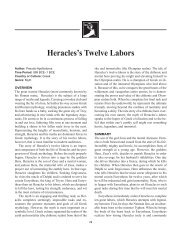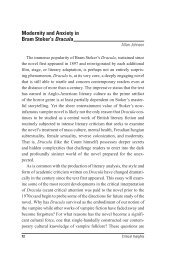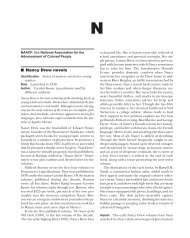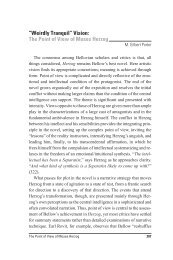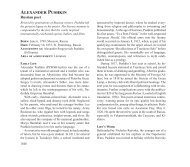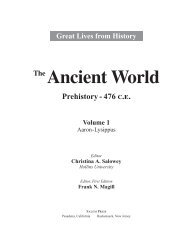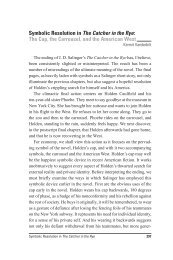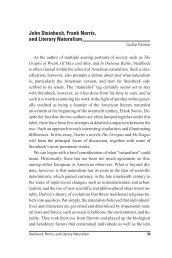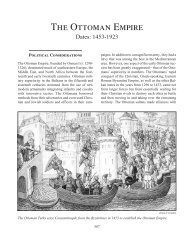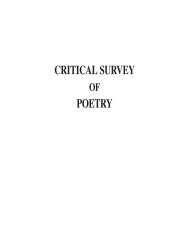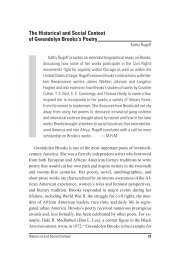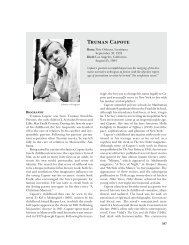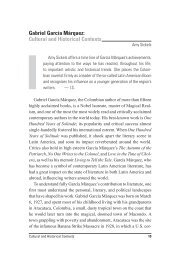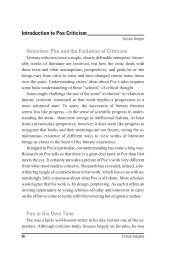“A Fragment of Lost Words”: Narrative Ellipses in The ... - Salem Press
“A Fragment of Lost Words”: Narrative Ellipses in The ... - Salem Press
“A Fragment of Lost Words”: Narrative Ellipses in The ... - Salem Press
You also want an ePaper? Increase the reach of your titles
YUMPU automatically turns print PDFs into web optimized ePapers that Google loves.
def<strong>in</strong><strong>in</strong>g narratology itself. Narratology might be thought <strong>of</strong> as an<br />
emerg<strong>in</strong>g field <strong>of</strong> study, a critical approach to literature, film, and other<br />
media that coalesces around Roland Barthes’writ<strong>in</strong>gs <strong>of</strong> the 1960s and<br />
Wayne Booth’s sem<strong>in</strong>al 1961 study, <strong>The</strong> Rhetoric <strong>of</strong> Fiction. Yet one<br />
could also trace the discussion <strong>of</strong> narrative elements back to Aristotle’s<br />
writ<strong>in</strong>g on drama, see<strong>in</strong>g the work <strong>of</strong> Barthes, Booth, and their contemporaries<br />
as cont<strong>in</strong>u<strong>in</strong>g a conversation that is several millennia <strong>in</strong> the<br />
mak<strong>in</strong>g. <strong>The</strong> early twentieth-century writ<strong>in</strong>gs <strong>of</strong> the Russian formalists,<br />
notably Vladimir Propp and Mikhail Bakht<strong>in</strong>, both <strong>of</strong> whose work began<br />
to appear <strong>in</strong> English translation <strong>in</strong> the 1970s, are likewise vital to this<br />
conversation. Narratologists also draw on the reflections and theories<br />
<strong>of</strong> English and American novelists, such as E. M. Forster and Henry<br />
James. Narratology is therefore a polyglot and heterogeneous school<br />
<strong>of</strong> theory. Its practitioners take a magpie’s approach to literary criticism,<br />
mak<strong>in</strong>g use <strong>of</strong> whatever material serves their needs.<br />
It is appropriate that narratology should be a heterogeneous mode <strong>of</strong><br />
criticism, for the literary form that is most commonly its subject—the<br />
novel—is itself pr<strong>of</strong>oundly heterogeneous. <strong>The</strong> novel is a mixed form,<br />
one that, <strong>in</strong> the hands <strong>of</strong> a good writer, is pliable, <strong>in</strong>clusive, and expansive.<br />
Its formal elements are so loosely def<strong>in</strong>ed as to seem <strong>in</strong>f<strong>in</strong>itely responsive<br />
to the warp and wo<strong>of</strong> <strong>of</strong> its themes and its subject matter. Its<br />
very name speaks <strong>of</strong> its “newness”; every great novel is a novelty. To<br />
see how widely novels vary <strong>in</strong> structure, one need only compare a collection<br />
<strong>of</strong> novels to a collection <strong>of</strong>, say, sermons, sonnets, fairy tales, or<br />
epics. Narratology may <strong>in</strong> fact be a response to the heterogeneous nature<br />
<strong>of</strong> the novel; it is an attempt to f<strong>in</strong>d a common language for discuss<strong>in</strong>g<br />
commonalities across radically different novels. <strong>The</strong> narratologist’s<br />
focus on literary elements (such as plot or sett<strong>in</strong>g), on the<br />
representation <strong>of</strong> time and action, and on the relationships among author,<br />
narrator, character, and reader might be seen as an effort to develop<br />
a poetics <strong>of</strong> fiction.<br />
Narratologists <strong>of</strong> all stripes would make a series <strong>of</strong> dist<strong>in</strong>ctions between<br />
author and narrator and between the text <strong>of</strong> the novel and the<br />
<strong>“A</strong> <strong>Fragment</strong> <strong>of</strong> <strong>Lost</strong> <strong>Words”</strong> 191



